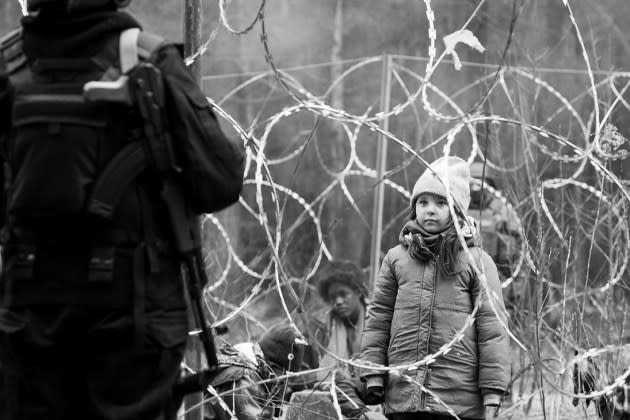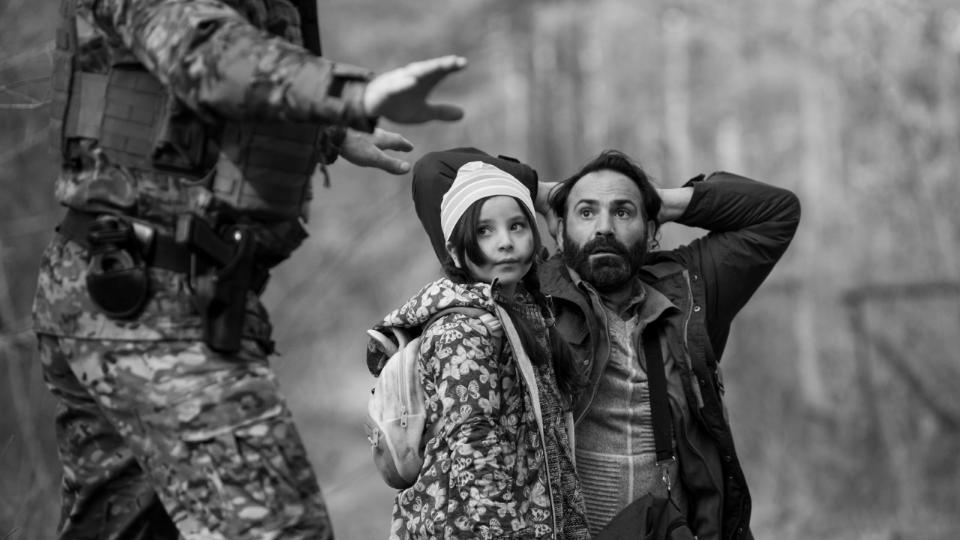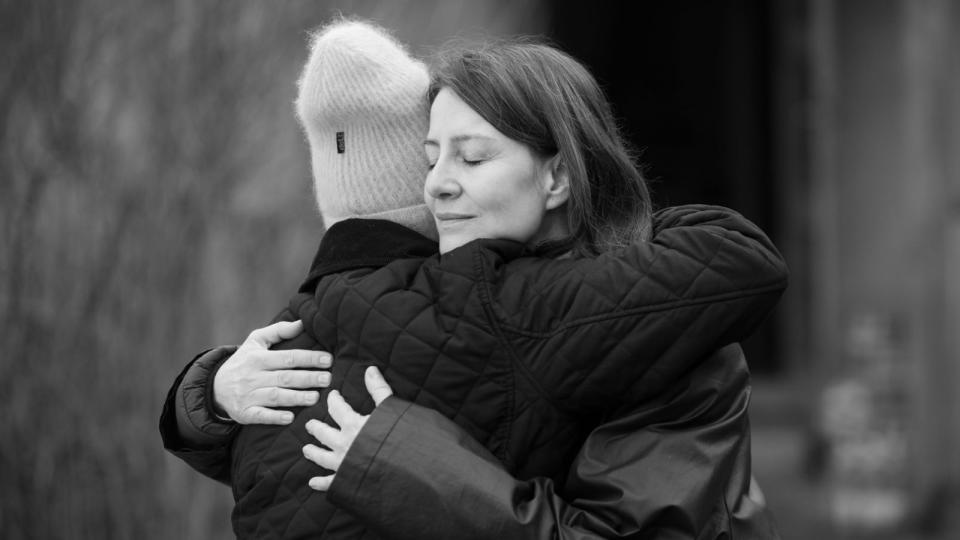Agnieszka Holland on ‘Green Border’ Political Backlash and Government Censorship
- Oops!Something went wrong.Please try again later.
- Oops!Something went wrong.Please try again later.

It’s a strange time for Agnieszka Holland. Green Border, the new film from the acclaimed Polish director — a three-time Oscar nominee — just celebrated the best opening for a Polish movie in cinemas this year with 137,000 admissions over its first weekend, according to local distributor Kino Świat. It’s particularly impressive given that the film, a black-and-white drama depicting the real-life plight of refugees stranded on the natural border between Poland and Belarus, can be a rough watch.
In late 2021, thousands of refugees from the Middle East and Africa were lured to the Polish border by Belarusian dictator Alexander Lukashenko, who cynically engineered a geopolitical crisis, promising migrants easy passage over the Polish border into the European Union. But the Polish government refused to let them in, leaving families stranded and starving in the swampy, treacherous forests between the two countries. Holland’s film intertwines the perspectives of the stranded refugees, Polish border guards, and activists defying the Polish government, which has sealed off the border area, to help the migrants in the forest. Jalal Altawil, Maja Ostaszewska, Behi Djanati Atai, Mohamad Al Rashi, Dalia Naous, Tomasz Włosok star. Films Boutique are selling the movie worldwide. Green Border is still looking for a U.S. distributor.
More from The Hollywood Reporter
Steve Coogan and Armando Iannucci Team for 'Dr. Strangelove' Stage Adaptation
Baz Luhrmann Named Jury President of Red Sea Film Festival in Saudi Arabia
Oscars: Denmark Picks 'The Promised Land' for Best International Feature Category
The movie’s local box office success follows acclaim in Venice, where Holland’s film won a special jury award and was universally praised by critics, including in The Hollywood Reporter, which in its review, called Green Border a “devastating dramatic triumph.”
But Green Border has also made the director a target for Poland’s right-wing government, which, in the midst of a tight re-election campaign (Polish parliamentary elections are on Oct. 15) has seized on refugees as a wedge issue, and on Holland as an easy political punching bag. Before the film even screened in Venice, members of the government began attacking it online.
Polish justice minister Zbigniew Ziobro compared the film to “Nazi propaganda” for its supposedly negative depiction of Polish police and border guards. (Holland has since filed a defamation suit against Ziobro). In a TV appearance, Polish President Andrzej Duda also made the Nazi comparison, calling for a boycott of the film, saying “only pigs sit in the cinema,” a World War II slogan used by the Polish resistance during German occupation when only Nazi propaganda films were shown in Polish theaters. Ahead of Green Border‘s release, the country’s interior minister took the unprecedented step of requiring all cinemas showing the film to screen a government-produced video ahead of the movie contradicting Holland’s portrayal of events.

Given Holland’s award pedigree — she received Oscar nominations for Angry Harvest (1985), Europa Europa (1992) and In Darkness (2011) — Green Border was considered a front-runner for Poland’s Oscar campaign this year. But, in the wake of the backlash, the country’s nomination committee put forward DK and Hugh Welchman’s animated literary adaptation The Peasants for Academy Award consideration in the best international feature category. The film, an adaptation of Polish author Wladyslaw Reymont’s Nobel Prize-winning novel, is set in a 19th-century rural village, its politics far from those of the current Polish election campaign.
“It wasn’t a surprise,” Holland says about the Oscar submission. “There was no way the government could condemn me and my film in this way and then allow it to be Poland’s official entry.”
Despite the attacks — which have included death threats against her personally — the 74-year-old director remains resolute in her determination to “tell the truth” about the migrant crisis being ignored by most in the mainstream media. To remind viewers, politicians, and voters, of the thousands still suffering and dying on the borders of fortress Europe.
The Hollywood Reporter spoke to Holland on several occasions, both before and after the film’s premiere. The following interview is a compilation of those discussions, edited for length and clarity.
How did you decide to make the situation of the refugees on the Polish-Belarusian border the subject of your new film?
I was already very sensitive to the situation with refugees from the start of the refugee crisis, at least the start in Europe, which was in 2014, and sensitive to the causes, including the war in Syrian and conditions across the Middle East, a region that has been totally destabilized by us in the West for many years. Now we see the results.
When it comes to my country and this specific situation, it was created by Vladimir Putin and by Belarus, who presented these refugees with what looked to them like the safest and least expensive way to get into the “paradise” of the European Union. The migrants immediately jumped at the possibility of coming to Minsk and then going to the border to cross over. The news spread very quickly over the Internet, very quickly. At that point, the Polish government and the Polish people weren’t responsible for creating the situation, or only responsible in the sense that Europe was responsible for contributing to the destabilization of the region in general. But starting from the moment when the people started to come here, started to cross the border into this forest — which is like an Amazonian forest, almost biblical, with swamps and rivers and they became trapped — there was the question of what to do with them. That became a question of law, of international law, of the law of the Polish constitution and of European law. They all say the same thing: That if a person comes asking for help, for protection, you have to let them in and give them a chance to prove they are really in danger if they are sent back home. That’s the normal procedure for asylum seekers. Of course, it’s costly. But it’s what you have to do.
And nothing like that has happened.
Instead, the government has mined the situation for political gold, and used the migrants to create a feeling of insecurity, danger and repulsion among the population, which is very easy to do, to rile up nationalistic and racist fears. They accuse the refugees of being terrorists and pedophiles — those are official statements by Polish ministers on television — and they stoke this fear.
I don’t think the Polish government is responsible for creating this crisis, but they haven’t done anything to alleviate it. They established this special exclusion zone, the special emergency state in the region, preventing the media, and humanitarian and medical organizations from getting in to help those people. They didn’t even allow opposition politicians in to see what was happening. It’s become the forbidden zone. A zone of fear. And, unfortunately, also a zone of death.
I decided it is so dangerous for the future of Europe altogether to accept this violence and to accept violence as a response to political problems. If we forget the rights of human beings just because they are “illegal,” just because they are they are Black or Arab, if we accept this, anything is possible. The next step will be mass killings. I did three films about the Holocaust. I did the film [Mr. Jones] about Stalin’s famine, in Ukraine. I know how easy it is to go past the point of no return, to the point where the violence only multiplies and becomes bigger and bigger.
So for human, moral, political, and for artistic reasons, I needed to do this film.
The film was put together very quickly and without any government support, which is extremely rare in Poland.
Yes, most Polish films get financing from the government, but we didn’t apply for any state funding because we wanted to stay independent. And we knew anyway that our film would be rejected, because of the subject matter. We shot practically in secret. I was able to convince several of my friends and collaborators to go with me and we did it in a very independent way.
The reaction of the Polish government to the refugees in 2021 was a sharp contrast to how refugees from Ukraine were welcomed after the Russian invasion in February 2022.
The basic difference between the refugees in our story and those who are crossing Ukraine’s borders today is simple: The color of their skin. We saw at the beginning of the war in Ukraine how Poland welcomed in the first few weeks, between two and three million refugees from Ukraine. The entire society showed extreme solidarity and generosity and was devoted to helping them, taking them in to live with them. I’ve had three families of different refugees from Ukraine stay with me since the start of the war. But now, after a year and a half, that enthusiasm, has gone down and we are seeing problems linked with the war in Ukraine. [Poland last week said it will no longer supply Ukraine with weapons to fight Russia, amid a rift between the two countries over agricultural exports.]
I think that the main reason for the change is the fear that has been created around refugees in Europe. You are seeing fascist politicians winning elections and they are changing Europe, destroying the European Union. But when democratic and liberal parties in Europe look the other way, and accept the use of violence against migrants on the border, that changes Europe as well. At the moment we are in the opposite of a win-win situation. It’s very much a lose-lose.
Why did you want to tell Green Border as a drama and not as a factual documentary?
Well, the first thing is that I do fiction films, not documentaries. I use the talents I have, and my means of expression. But in this particular situation, it was practically impossible to make a full-scale epic documentary because you simply don’t have access to many of the places, to the events and to the people. I couldn’t hope to find a border guard who would be willing to be the hero of my story in a documentary film, knowing it would make him the enemy of the regime. I wouldn’t have access to show what they are doing in the exclusion zone, because no one has had access since the pushback started becoming so violent. And it is difficult to get access to most of the refugees who have come over because they are in legal limbo here. They are afraid to be too vocal about what’s going on.
The decision to do the film the way I did has a lot to do with working in a country that uses police, and its military forces to block freedom of expression and freedom of work for journalists and documentary makers. Fiction becomes the only way to show what’s going on.
I also believe that fiction, if it is not manipulative but honest and direct, can touch the hearts and brains of people in a way that is slightly different from documentaries. It can do the work of empathy, identification with others can be easier through fiction if it is successful. Remember the one photo of the little boy’s body on the beach [Alan Kurdi] which moved the conscience of millions? Images are very important.

What do you hope to achieve, politically, with this film?
I don’t have the tools to resolve the global refugee problem. And I don’t think it’s possible to resolve because I think we have come to the point where, in several places on the planet, there are huge populations of people unable to live with dignity and security and so they will leave their homes because it is the only way to survive. We have to face this problem. We have to discuss it and look for real solutions and not the solution of the ostrich that sticks its head in the sand, ignoring the problem, or paying some dictator to keep them out of Europe or blocking the boats so they don’t land on European shores. None of that will resolve the problem.
Speaking about this movie, you’ve said it’s linked thematically to Europa, Europa, your 1992 film about a Jewish boy living in Nazi Germany who tries to conceal his identity, even joining the Hitler Youth. What connects the two films?
Both films reflect the duality I see in Europe itself. Green Border has a double meaning, as a place of beauty and a zone of death. It is similar to Europa, Europa, which is perhaps my best-known film and which is about the Holocaust. For me, Europe also has this duality. On one hand, it is the cradle of civilization, of culture, of democracy, human rights and egalitarianism. On the other hand, it is the cradle of the most terrible, massive crimes against humanity in the history of the world. It can always tip towards one or the other. At the moment we are at a point where that balance has become very dangerous for the future of Europe.
Do you still have hope, after all you’ve seen and experienced, for that first Europe — Europe as a cradle of civilization and human rights?
My belief in Europe was never naive. I’m of the generation that grew up behind the Iron Curtain. I lived under the communist regime, and I was opposed to that and paid the price, including prison. Of course, I was happy in 1989, when the Berlin Wall fell. It was so unexpected, it was like a miracle. Like achieving the dream of a generation. But at the same time, I knew that moment would not be forever and that we had to be very careful. Democracy is a very difficult thing, and people actually have a problem with freedom because freedom means taking responsibility, and many people don’t want to take responsibility.
Interview edited for length and clarity.
Best of The Hollywood Reporter
Kim Cattrall and Five Actors Who Made Surprising Returns to a Role
10 Times Hollywood Predicted the Scary (or Not So Scary) Future of AI
21 Actors Who Committed to Method Acting at Some Point in Their Career

